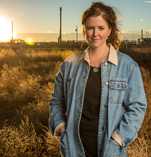Professor of Common Ground
By Deborah Moors, Photography by Rob Trubia
If students walk into professor Karen Barton’s geography class expecting to learn about maps, they find instead they’re navigating a whole new perspective on landscapes, people, place, politics
and life.
“In geography,” Barton says, “we’re interested in the way humans transform the landscape and the way the landscape shapes us.”
Barton, who earned her bachelor’s degree in social ecology from University of California Irvine, and her master’s and doctorate at the University of Arizona in geography, came to UNC 10 years ago. She teaches students to see the links and connections between people, place, and food.
Some of the topics she covers — food deserts, hydrofracturing and poverty — can be polarizing and political. Delving beneath the surface of each issue, she finds a place where topics can be considered from all sides.
Food deserts are places where fresh, healthy food isn’t easily available, defined as areas where the closest grocery store is 10 or more miles away. For the elderly or people without vehicles, that distance puts healthy food out of reach; they may rely instead on packaged and processed foods from local convenience stores. And, while many people think of food deserts as inner city areas, Barton’s students learn that food deserts aren’t confined to heavily populated cities. In Colorado, large rural areas can be an hour or more from supermarkets.
As Barton researches food deserts and community issues that contribute to them, her students have been able to see the problem from ground-level, where they see the people affected and learn about food availability, social issues, community and culture. Along the way, her students have toured the places where food originates, and explored issues related to food and community. They’ve gone to meat processing and slaughter plants and toured the Weld Food Bank. Her research and classes have helped students understand that behind these highly visible issues are real people, communities and cultures.
“Dr. Barton’s teaching — and a research project I worked on with her — changed how I view topics, especially political ones, by opening my mind to the possibilities which can lead to the root of an issue. I now try to view issues with an open mind and fully research my arguments,” says Adrien Hoff, a recent UNC graduate in anthropology who minored in geography. She worked closely with Barton as a research assistant on food deserts.
“We examined a new theory of food deserts and took it out of large city context, applying it to rural areas in Colorado outside the Front Range,” says Hoff. “This shift of location provided us with the knowledge that many rural areas have been neglected and marked as food deserts since at least the 1800s.”
As social and economic issues evolve and people in small, rural Colorado communities find their region changing, they need to be able to find ways not only to solve problems, but to come together and develop solutions without divisiveness. In some cases, communities have worked to solve the problem by creating food co-ops to bring food into a local store. Issues revolving around hydrofracturing and poverty may also add a layer of complexity, and that’s where students see issues in a broader sense.
Hoff says that Barton’s approach brought facets of critical thinking and wider consideration to issues that often carry potential for conflict.
“Dr. Barton is passionate about human behavior and concerned with the issues we all face day-to-day. She tackles so many topics with a full heart and willingly opens the door to both sides of a debate. Her teaching impacts how I approach my work by leaving my mind open to the cultural background everyone comes from, and by fueling my passion for educating the public.”
Barton’s effort to encourage an open-minded, solution-focused approach impacts not only her students, but also Colorado communities as she seeks common ground in changing social landscapes. She recently completed a summer research project titled “Oil and Gas Perspectives in Colorado: Engaging Farmers and Frackers in Dialogues of Development” that was funded by UNC’s Summer Support Initiative. For the project, both oil workers and farmers were interviewed in order to better understand stakeholders’ challenges and benefits of navigating the new energy economy. As a result, industry workers and farmers will meet in April 2016 at UNC to discuss oil and gas perspectives.





